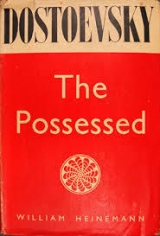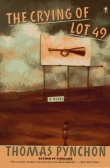
Текст книги "The Possessed"
Автор книги: Федор Достоевский
сообщить о нарушении
Текущая страница: 13 (всего у книги 49 страниц)
“For your servants, madam; for the footman who picks it up. Let them remember my sister!”
“I cannot allow that,” Varvara Petrovna brought out hurriedly, even with some alarm.
“In that case . . .”
He bent down, picked it up, flushing crimson, and suddenly going up to Varvara Petrovna held out the notes he had counted.
“What's this?” she cried, really alarmed at last, and positively shrinking back in her chair.
Mavriky Nikolaevitch, Stepan Trofimovitch, and I all stepped forward.
“Don't be alarmed, don't be alarmed; I'm not mad, by God, I'm not mad,” the captain kept asseverating excitedly. “Yes, sir, you're out of your senses.”
“Madam, she's not at all as you suppose. I am an insignificant link. Oh, madam, wealthy are your mansions, but poor is the dwelling of Marya Anonyma, my sister, whose maiden name was Lebyadkin, but whom we'll call Anonyma for the time, only for the time,madam, for God Himself will not suffer it for ever. Madam, you gave her ten roubles and she took it, because it was from you,madam! Do you hear, madam? From no one else in the world would this Marya Anonyma take it, or her grandfather, the officer killed in the Caucasus before the very eyes of Yermolov, would turn in his grave. But from you, madam, from you she will take anything. But with one hand she takes it, and with the other she holds out to you twenty roubles by way of subscription to one of the benevolent committees in Petersburg and Moscow, of which you are a member . . . for you published yourself, madam, in the Moscow News,that you are ready to receive subscriptions in our town, and that any one may subscribe. . . .”
The captain suddenly broke off; he breathed hard as though after some difficult achievement. All he said about the benevolent society had probably been prepared beforehand, perhaps under Liputin's supervision. He perspired more than ever; drops literally trickled down his temples. Varvara Petrovna looked searchingly at him.
“The subscription list,” she said severely, “is always downstairs in charge of my porter. There you can enter your subscriptions if you wish to. And so I beg you to put your notes away and not to wave them in the air. That's right. I beg you also to go back to your seat. That's right. I am very sorry, sir, that I made a mistake about your sister, and gave her something as though she were poor when she is so rich. There's only one thing I don't understand, why she can only take from me, and no one else. You so insisted upon that that I should like a full explanation.”
“Madam, that is a secret that may be buried only in the grave!” answered the captain.
“Why?” Varvara Petrovna asked, not quite so firmly.
“Madam, madam . . .”
He relapsed into gloomy silence, looking on the floor, laying his right hand on his heart. Varvara Petrovna waited, not taking her eyes off him.
“Madam!” he roared suddenly. “Will you allow me to ask you one question? Only one, but frankly, directly, like a Russian, from the heart?”
“Kindly do so.”
“Have you ever suffered madam, in your life?”
“You simply mean to say that you have been or are being ill-treated by some one.”
“Madam, madam!” He jumped up again, probably unconscious of doing so, and struck himself on the breast. “Here in this bosom so much has accumulated, so much that God Himself will be amazed when it is revealed at the Day of Judgment.”
“H'm! A strong expression!”
“Madam, I speak perhaps irritably. . . .”
“Don't be uneasy. I know myself when to stop you.”
“May I ask you another question, madam?”
“Ask another question.”
“Can one die simply from the generosity of one's feelings?”
“I don't know, as I've never asked myself such a question.”
“You don't know! You've never asked yourself such a question,” he said with pathetic irony. “Well, if that's it, if that's it ...
“ Be still, despairing heart!”
And he struck himself furiously on the chest. He was by now walking about the room again.
It is typical of such people to be utterly incapable of keeping their desires to themselves; they have, on the contrary, an irresistible impulse to display them in all their unseemliness as soon as they arise. When such a gentleman gets into” a circle in which he is not at home he usually begins timidly,-but you have only to give him an inch and he will at once rush into impertinence. The captain was already excited. He walked about waving his arms and not listening to questions, talked about himself very, very quickly, so that sometimes his tongue would not obey him, and without finishing one phrase he passed to another. It is true he was probably not quite sober. Moreover, Lizaveta Nikolaevna was sitting there too, and though he did not once glance at her, her presence seemed to over-excite him terribly; that, however, is only my supposition. There must have been some reason which led Varvara Petrovna to resolve to listen to such a man in spite of her repugnance, Praskovya Ivanovna was simply shaking with terror, though, I believe she really did not quite understand what it was about.'' Stepan Trofimovitch was trembling too, but that was, on the contrary, because he was disposed to understand everything, and exaggerate it. Mavriky Nikolaevitch stood in the attitude of one ready to defend all present; Liza was pale, and she gazed fixedly with wide-open eyes at the wild captain. Shatov sat in the same position as before, but, what was strangest of all, Marya Timofyevna had not only ceased laughing, but had become terribly sad. She leaned her right elbow on the table, and with a prolonged, mournful gaze watched her brother declaiming. Darya Pavlovna alone seemed to me calm.
“All that is nonsensical allegory,” said Varvara Petrovna, getting angry at last. “You haven't answered my question, why? I insist on an answer.”
“I haven't answered, why? You insist on an answer, why?” repeated the captain, winking. “That little word 'why' has run through all the universe from the first day of creation, and all nature cries every minute to it's Creator, 'why?' And for seven thousand years it has had no answer, and must Captain Lebyadkin alone answer? And is that justice, madam?”
“That's all nonsense and not to the point!” cried Varvara Petrovna, getting angry and losing patience. “That's allegory; besides, you express yourself too sensationally, sir, which I consider impertinence.”
“Madam,” the captain went on, not hearing, “I should have liked perhaps to be called Ernest, yet I am forced to bear the vulgar name Ignat – why is that do you suppose? I should have liked to be called Prince de Monbart, yet I am only Lebyadkin, derived from a swan.* Why is that? I am a poet, madam, a poet in soul, and might be getting a thousand roubles at a time from a publisher, yet I am forced to live in a pig pail. Why? Why, madam? To my mind Russia is a freak of nature and nothing else.”
“Can you really say nothing more definite?”
“I can read you the poem, 'The Cockroach,' madam.”
“Wha-a-t?”
“Madam, I'm not mad yet! I shall be mad, no doubt I shall be, but I'm not so yet. Madam, a friend of mine – a most honourable man – has written a Krylov's fable, called 'The Cockroach.' May I read it?”
“You want to read some fable of Krylov's?”
“No, it's not a fable of Krylov's I want to read. It's my fable, my own composition. Believe me, madam, without offence I'm not so uneducated and depraved as not to understand that Russia can boast of a great fable-writer, Krylov, to whom the Minister of Education has raised a monument in the Summer Gardens for the diversion of the young. Here, madam, you ask me why? The answer is at the end of this fable, in letters of fire.”
“Read your fable.”
“ Lived a cockroach in the world
Such was his condition,
In a glass he chanced to fall
Full of fly-perdition.”
“Heavens! What does it mean?” cried Varvara Petrovna. “That's when flies get into a glass in the summer-time,” the captain explained hurriedly with the irritable impatience of an author interrupted in reading. “Then it is perdition to the flies, any fool can understand. Don't interrupt, don't interrupt. You'll see, you'll see. . . .” He kept waving his arms.
“ But he squeezed against the flies,
They woke up and cursed him,
Raised to Jove their angry cries;
'The glass is full to bursting!'
In the middle of the din
Came along Nikifor,
Fine old man, and looking in . . .
* From Lebyed, a Swan.
I haven't quite finished it. But no matter, I'll tell it in words,” the captain rattled on. “Nikifor takes the glass, and in spite of their outcry empties away the whole stew, flies, and beetles and all, into the pig pail, which ought to have been done long ago. But observe, madam, observe, the cockroach doesn't complain. That's the answer to your question, why?” he cried triumphantly. “' The cockroach does not complain.' As for Nikifor he typifies nature,” he added, speaking rapidly and walking complacently about the room.
Varvara Petrovna was terribly angry.
“And allow me to ask you about that money said to have been received from Nikolay Vsyevolodovitch, and not to have been given to you, about which you dared to accuse a person belonging to my household.”
“It's a slander!” roared Lebyadkin, flinging up his right hand tragically.
“No, it's not a slander.”
“Madam, there are circumstances that force one to endure family disgrace rather than proclaim the truth aloud. Lebyadkin will not blab, madam!”
He seemed dazed; he was carried away; he felt his importance; he certainly had some fancy in his mind. By now he wanted to insult some one, to do something nasty to show his power.
“Ring, please, Stepan Trofimovitch,” Varvara Petrovna asked him.
“Lebyadkin's cunning, madam.” he said, winking with his evil smile; “he's cunning, but he too has a weak spot, he too at times is in the portals of passions, and these portals are the old military hussars' bottle, celebrated by Denis Davydov. So when he is in those portals, madam, he may happen to send a letter in verse, a most magnificent letter – but which afterwards he would have wished to take back, with the tears of all his life; for the feeling of the beautiful is destroyed. But the bird has flown, you won't catch it by the tail. In those portals now, madam, Lebyadkin may have spoken about an honourable young lady, in the honourable indignation of a soul revolted by wrongs, and his slanderers have taken advantage of it. But Lebyadkin is cunning, madam! And in vain a malignant wolf sits over him every minute, filling his glass and waiting for the end. Lebyadkin won't blab. And at the bottom of the bottle he always finds instead Lebyadkin's cunning. But enough, oh, enough, madam! Your splendid halls might belong to the noblest in the land, but the cockroach will not complain. Observe that, observe that he does not complain, and recognise his noble spirit!”
At that instant a bell rang downstairs from the porter's room, and almost at the same moment Alexey Yegorytch appeared in response to Stepan Trofimovitch's ring, which he had somewhat delayed answering. The correct old servant was unusually excited.
“Nikolay Vsyevolodovitch has graciously arrived this moment and is coming here,” he pronounced, in reply to Varvara Petrovna's questioning glance. I particularly remember her at that moment; at first she turned pale, but suddenly her eyes flashed. She drew herself up in her chair with an air of extraordinary determination. Every one was astounded indeed. The utterly unexpected arrival of Nikolay Vsyevolodovitch, who was not expected for another month, was not only strange from its unexpectedness but from its fateful coincidence with the present moment. Even the captain remained standing like a post in the middle of the room with his mouth wide open, staring at the door with a fearfully stupid expression.
And, behold, from the next room – a very large and long apartment – came the sound of swiftly approaching footsteps, little, exceedingly rapid steps; some one seemed to be running, and that some one suddenly flew into the drawing-room, not Nikolay Vsyevolodovitch, but a young man who was a complete stranger to all.
V
I will permit myself to halt here to sketch in a few hurried strokes this person who had so suddenly arrived on the scene.
He was a young man of twenty-seven or thereabouts, a little above the medium height, with rather long, lank, flaxen hair, and with faintly defined, irregular moustache and beard. He was dressed neatly, and in the fashion, though not like a dandy. At the first glance he looked round-shouldered and awkward, but yet he was not round-shouldered, and his manner was easy. He seemed a queer fish, and yet later on we all thought his manners good, and his conversation always to the point.
No one would have said that he was ugly, and yet no one would have liked his face– His head was elongated at the back, and looked flattened at the sides, so that his face seemed pointed, his forehead was high and narrow, but his features were small; his eyes were keen, his nose was small and sharp, his lips were long and thin. The expression of his face suggested ill-health, but this was misleading. He had a wrinkle on each cheek which gave him the look of a man who had just recovered from a serious illness. Yet he was perfectly well and strong, and had never been ill.
He walked and moved very hurriedly, yet never seemed in a hurry to be off. It seemed as though nothing could disconcert him; in every circumstance and in every sort of society he remained the same. He had a great deal of conceit, but was utterly unaware of it himself.
He talked quickly, hurriedly, but at the same time with assurance, and was never at a loss for a word. In spite of his hurried manner his ideas were in perfect order, distinct and definite – and this was particularly striking. His articulation was wonderfully clear. His words pattered out like smooth, long grains, always well chosen, and at your service. At first this attracted one, but afterwards it became repulsive, just because of this over-distinct articulation, this string of ever-ready words, one somehow began to imagine that he must have a tongue of special shape, somehow exceptionally long and thin, extremely red with a very sharp everlastingly active little tip.
Well, this was the young man who darted now into the drawing-room, and really, I believe to this day, that he began to talk in the next room, and came in speaking. He was standing before Varvara Petrovna in a trice.
“. . . Only fancy, Varvara Petrovna,” he pattered on, “I came in expecting to find he'd been here for the last quarter of an hour; he arrived an hour and a half ago; we met at Kirillov's: he set off half an hour ago meaning to come straight here, and told me to come here too, a quarter of an hour later. ...”
“But who? Who told you to come here?” Varvara Petrovna inquired.
“Why, Nikolay Vsyevolodovitch! Surely this isn't the first you've heard of it! But his luggage must have been here a long while, anyway. How is it you weren't told? Then I'm the first to bring the news. One might send out to look for him; he's sure to be here himself directly though. And I fancy, at the moment that just fits in with some of his expectations, and is far as I can judge, at least, some of his calculations.”
At this point he turned his eyes about the room and fixed them with special attention on the captain.
“Ach, Lizaveta Nikolaevna, how glad I am to meet you at the very first step, delighted to shake hands with you.” He flew up to Liza, who was smiling gaily, to take her proffered hand, “and I observe that my honoured friend Praskovya Ivanovna has not forgotten her 'professor,' and actually isn't cross with him, as she always used to be in Switzerland. But how are your legs, here, Praskovya Ivanovna, and were the Swiss doctors right when at the consultation they prescribed your native air? What? Fomentations? That ought to do good. But how sorry I was, Varvara Petrovna “(he turned rapidly to her) ''that I didn't arrive in time to meet you abroad, and offer my respects to you in person; I had so much to tell you too. I did send word to my old man here, but I fancy that he did as-he always does . , .”
“Petrusha!” cried Stepan Trofimovitch, instantly roused from his stupefaction. He clasped his hands and flew to his son. “ Pierre, mon enfant!Why, I didn't know you!” He pressed him in his arms and the tears rolled down his cheeks.
“Come, be quiet, be quiet, no flourishes, that's enough, that's enough, please,” Petrusha muttered hurriedly, trying to extricate himself from his embrace.
“I've always sinned against you, always!”
“Well, that's enough. We can talk of that later. I knew you'd carry on. Come, be a little more sober, please.”
“But it's ten years since I've seen you.”
“The less reason for demonstrations.”
“ Mon enfant! . . .”
“Come, I believe in your affection, I believe in it, take your arms away. You see, you're disturbing other people. . . . Ah, here's Nikolay Vsyevolodovitch; keep quiet, please.”
Nikolay Vsyevolodovitch was already in the room; he came in very quietly and stood still for an instant in the doorway, quietly scrutinising the company.
I was struck by the first sight of him just as I had been four years before, when I saw him for the first time. I had not forgotten him in the least. But I think there are some countenances which always seem to exhibit something new which one has not noticed before, every time one meets them, though one may have seen them a hundred times already. Apparently he was exactly the same as he had been four years before. He was as elegant, as dignified, he moved with the same air of consequence as before, indeed he looked almost as young. His faint smile had just the same official graciousness and complacency. His eyes had the same stern, thoughtful and, as it were, preoccupied look. In fact, it seemed as though we had only parted the day before. But one thing struck me. In old days, though he had been considered handsome, his face was “like a mask,” as some of our sharp-tongued ladies had expressed it. Now – now, I don't know why he impressed me at once as absolutely, incontestably beautiful, so that no one could have said that his face was like a mask. Wasn't it perhaps that he was a little paler and seemed rather thinner than before? Or was there, perhaps, the light of some new idea in his eyes?
“Nikolay Vsyevolodovitch!” cried Varvara Petrovna, drawing herself up but not rising from her chair. “Stop a minute!” She checked his advance with a peremptory gesture.
But to explain the awful question which immediately followed that gesture and” exclamation – a question which I should have imagined to be impossible even in Varvara Petrovna, I must ask the reader to remember what that lady's temperament had always been, and the extraordinary impulsiveness she showed at some critical moments. I beg him to consider also, that in spite of the exceptional strength of her spirit and the very considerable amount of common sense and practical, so to say business, tact she possessed, there were moments in her life in which she abandoned herself altogether, entirely and, if it's permissible to say so, absolutely without restraint. I beg him to take into consideration also that the present moment might really be for her one of those in which all the essence of life, of all the past and all the present, perhaps, too, all the future, is concentrated, as it were, focused. I must briefly recall, too, the anonymous letter of which she had spoken to Praskovya Ivanovna with so much irritation, though I think she said nothing of the latter part of it. Yet it perhaps contained the explanation of the possibility of the terrible question with which she suddenly addressed her son.
“Nikolay Vsyevolodovitch,” she repeated, rapping out her words in a resolute voice in which there was a ring of menacing challenge, “I beg you to tell me at once, without moving from that place; is it true that this unhappy cripple – here she is, here, look at her – is it true that she is ... your lawful wife?”
I remember that moment only too well; he did not wink an eyelash but looked intently at his mother. Not the faintest change in his face followed. At last he smiled, a sort of indulgent smile, and without answering a word went quietly up to his mother, took her hand, raised it respectfully to his lips and kissed it. And so great was his invariable and irresistible ascendancy over his mother that even now she could not bring herself to pull away her hand. She only gazed at him, her whole figure one concentrated question, seeming to betray that she could not bear the suspense another moment.
But he was still silent. When he had kissed her hand, he scanned the whole room once more, and moving, as before, without haste went towards Marya Timofyevna. It is very difficult to describe people's countenances at certain moments. I remember, for instance, that Marya Timofyevna, breathless with fear, rose to her feet to meet him and clasped her hands before her, as though beseeching him. And at the same time I remember the frantic ecstasy which almost distorted her face – an ecstasy almost too great for any human being to bear. Perhaps both were there, both the terror and the ecstasy. But I remember moving quickly towards her (I was standing not far off), for I fancied she was going to faint.
“You should not be here,” Nikolay Vsyevolodovitch said to her in a caressing and melodious voice; and there was the light of an extraordinary tenderness in his eyes. He stood before her in the most respectful attitude, and every gesture showed sincere respect for her. The poor girl faltered impulsively in a half-whisper.
“But may I ... kneel down ... to you now?”
“No, you can't do that.”
He smiled at her magnificently, so that she too laughed joyfully at once. In the same melodious voice, coaxing her tenderly as though she were a child, he went on gravely.
“Only think that you are a girl, and that though I'm your devoted friend I'm an outsider, not your husband, nor your father, nor your betrothed. Give me your arm and let us go; I will take you to the carriage, and if you will let me I will see you all the way home.”
She listened, and bent her head as though meditating.
“Let's go,” she said with a sigh, giving him her hand.
But at that point a slight mischance befell her. She must have turned carelessly, resting on her lame leg, which was shorter than the other. She fell sideways into the chair, and if the chair had not been there would have fallen on to the floor. He instantly seized and supported her, and holding her arm firmly in his, led her carefully and sympathetically to the door. She was evidently mortified at having fallen; she was overwhelmed, blushed, and was terribly abashed. Looking dumbly on the ground, limping painfully, she hobbled after him, almost hanging on his arm. So they went out. Liza, I saw, suddenly jumped up from her chair for some reason as they were going out, and she followed them with intent eyes till they reached the door. Then she sat down again in silence, but there was a nervous twitching in her face, as though she had touched a viper.
While this scene was taking place between Nikolay Vsyevolodovitch and Marya Timofyevna every one was speechless with amazement; one could have heard a fly; but as soon as they had gone out, every one began suddenly talking.
VI
It was very little of it talk, however; it was mostly exclamation. I've forgotten a little the order in which things happened, for a scene of confusion followed. Stepan Trofimovitch uttered some exclamation in French, clasping his hands, but Varvara Petrovna had no thought for him. Even Mavriky Nikolaevitch muttered some rapid, jerky comment. But Pyotr Stepanovitch was the most excited of all. He was trying desperately with bold gesticulations to persuade Varvara Petrovna of something, but it was a long time before I could make out what it was. He appealed to Praskovya Ivanovna, and Lizaveta Nikolaevna too, even, in his excitement, addressed a passing shout to his father – in fact he seemed all over the room at once. Varvara Petrovna, flushing all over, sprang up from her seat and cried to Praskovya Ivanovna:
“Did you hear what he said to her here just now, did you hear it?”
But the latter was incapable of replying. She could only mutter something and wave her hand. The poor woman had troubles of her own to think about. She kept turning her head towards Liza and was watching her with unaccountable terror, but she didn't even dare to think of getting up and going away until her daughter should get up. In the meantime the captain wanted to slip away. That I noticed. There was no doubt that he had been in a great panic from the instant that Nikolay Vsyevolodovitch had made his appearance; but Pyotr Stepanovitch took him by the arm and would not let him go.
“It is necessary, quite necessary,” he pattered on to Varvara Petrovna, still trying to persuade her. He stood facing her, as she was sitting down again in her easy chair, and, I remember, was listening to him eagerly; he had succeeded in securing her attention.
“It is necessary. You can see for yourself, Varvara Petrovna, that there is a misunderstanding here, and much that is strange on the surface, and yet the thing's as clear as daylight, and as simple as my finger. I quite understand that no one has authorised me to tell the story, and I dare say I look ridiculous putting myself forward. But in the first place, Nikolay Vsyevolodovitch attaches no sort of significance to the matter himself, and, besides, there are incidents of which it is difficult for a man to make up his mind to give an explanation himself. And so it's absolutely necessary that it should be undertaken by a third person, for whom it's easier to put some delicate points into words. Believe me, Varvara Petrovna, that Nikolay Vsyevolodovitch is not at all to blame for not immediately answering your question just now with a full explanation, it's all a trivial affair. I've known him since his Petersburg days. Besides, the whole story only does honour to Nikolay Vsyevolodovitch, if one must make use of that vague word 'honour.' “
“You mean to say that you were a witness of some incident which gave rise ... to this misunderstanding?” asked Varvara Petrovna.
“I witnessed it, and took part in it,” Pyotr Stepanovitch hastened to declare.
“If you'll give me your word that this will not wound Nikolay Vsyevolodovitch's delicacy in regard to his feeling for me, from whom he ne-e-ver conceals anything . . . and if you are convinced also that your doing this will be agreeable to him . . .”
“Certainly it will be agreeable, and for that reason I consider it a particularly agreeable duty. I am convinced that he would beg me to do it himself.”
The intrusive desire of this gentleman, who seemed to have dropped on us from heaven to tell stories about other people's affairs, was rather strange and inconsistent with ordinary usage.
But he had caught Varvara Petrovna by touching on too painful a spot. I did not know the man's character at that time, and still less his designs.
“I am listening,” Varvara Petrovna announced with a reserved and cautious manner. She was rather painfully aware of her condescension.
“It's a short story; in fact if you like it's not a story at all,” he rattled on, “though a novelist might work it up into a novel in an idle hour. It's rather an interesting little incident, Praskovya Ivanovna, and I am sure that Lizaveta Nikolaevna will be interested to hear it, because there are a great many things in it that are odd if not wonderful. Five years ago, in Petersburg, Nikolay Vsyevolodovitch made the acquaintance of this gentleman, this very Mr. Lebyadkin who's standing here with his mouth open, anxious, I think, to slip away at once. Excuse me, Varvara Petrovna. I don't advise you to make your escape though, you discharged clerk in the former commissariat department you see; I remember you very well. Nikolay Vsyevolodovitch and I know very well what you've been up to here, and, don't forget, you'll have to answer for it. I ask your pardon once more, Varvara Petrovna. In those days Nikolay Vsyevolodovitch used to call this gentleman his Falstaff; that must be,” he explained suddenly, “some old burlesque character, at whom every one laughs, and who is willing to let every one laugh at him, if only they'll pay him for it. Nikolay Vsyevolodovitch was leading at that time in Petersburg a life, so to say, of mockery. I can't find another word to describe it, because he is not a man who falls into disillusionment, and he disdained to be occupied with work at that time. I'm only speaking of that period, Varvara Petrovna. Lebyadkin had a sister, the woman who was sitting here just now. The brother and sister hadn't a corner * of their own, but were always quartering themselves on different people. He used to hang about the arcades in the Gostiny Dvor, always wearing his old uniform, and would stop the more respectable-looking passers-by, and everything he got from them he'd spend in drink. His sister lived like the birds of heaven. She'd help people in their 'corners,' and do jobs for them on occasion. It was a regular Bedlam. I'll pass over the description of this life in 'corners,' a life to which Nikolay Vsyevolodovitch had taken,”
* In the poorer quarters of Russian towns a single room is often let out to several families, each of which occupies a “corner.”
“at that time, from eccentricity. I'm only talking of that period, Varvara Petrovna; as for 'eccentricity,' that's his own expression. He does not conceal much from me. Mile. Lebyadkin, who was thrown in the way of meeting Nikolay Vsyevolodovitch very often, at one time, was fascinated by his appearance. He was, so to say, a diamond set in the dirty background of her life. I am a poor hand at describing feelings, so I'll pass them over; but some of that dirty lot took to jeering at her once, and it made her sad. They always had laughed at her, but she did not seem to notice it before. She wasn't quite right in her head even then, but very different from what she is now. There's reason to believe that in her childhood she received something like an education through the kindness of a benevolent lady. Nikolay Vsyevolodovitch had never taken the slightest notice of her. He used to spend his time chiefly in playing preference with a greasy old pack of cards for stakes of a quarter-farthing with clerks. But once, when she was being ill-treated, he went up (without inquiring into the cause) and seized one of the clerks by the collar and flung him out of a second-floor window. It was not a case of chivalrous indignation at the sight of injured innocence; the whole operation took place in the midst of roars of laughter, and the one who laughed loudest was Nikolay Vsyevolodovitch himself. As it all ended without harm, they were reconciled and began drinking punch. But the injured innocent herself did not forget it. Of course it ended in her becoming completely crazy. I repeat I'm a poor hand at describing feelings. But a delusion was the chief feature in this case. And Nikolay Vsyevolodovitch aggravated that delusion as though he did it on purpose. Instead of laughing at her he began all at once treating Mile. Lebyadkin with sudden respect. Kirillov, who was there (a very original man, Varvara Petrovna, and very abrupt, you'll see him perhaps one day, for he's here now), well, this Kirillov who, as a rule, is perfectly silent, suddenly got hot, and said to Nikolay Vsyevolodovitch, I remember, that he treated the girl as though she were a marquise, and that that was doing for her altogether. I must add that Nikolay Vsyevolodovitch had rather a respect for this Kirillov. What do you suppose was the answer he gave him: 'You imagine, Mr. Kirillov, that I am laughing at her. Get rid of that idea, I really do respect her, for she's better than any of us.' And, do you know, he said it in such a serious tone. Meanwhile, he hadn't really said a word to her for two or three months, except 'good morning' and 'good-bye.' I remember, for I was there, that she came at last to the point of looking on him almost as her betrothed who dared not 'elope with her,' simply because he had many enemies and family difficulties, or something of the sort. There was a great deal of laughter about it. It ended in Nikolay Vsyevolodovitch's making provision for her when he had to come here, and I believe he arranged to pay a considerable sum, three hundred roubles a year, if not more, as a pension for her. In short it was “all a caprice, a fancy of a man prematurely weary on his side, perhaps – it may even have been, as Kirillov says, a new experiment of a blase man, with the object of finding out what you can bring a crazy cripple to.” (You picked out on purpose, he said, the lowest creature, a cripple, for ever covered with disgrace and blows, knowing, too, that this creature was dying of comic love for you, and set to work to mystify her completely on purpose, simply to see what would come of it.) “Though, how is a man so particularly to blame for the fancies of a crazy woman, to whom he had hardly uttered two sentences the whole time. There are things, Varvara Petrovna, of which it is not only impossible to speak sensibly, but it's even nonsensical to begin speaking of them at all. Well, eccentricity then, let it stand at that. Anyway, there's nothing worse to be said than that; and yet now they've made this scandal out of it. ... I am to some extent aware, Varvara Petrovna, of what is happening here.”








